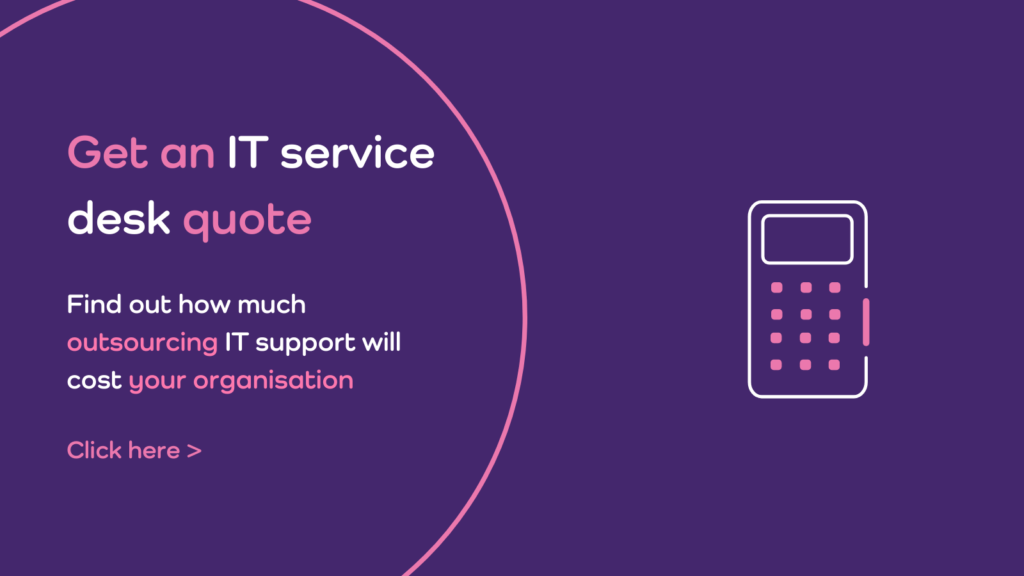A key differentiator between IT service desk providers is how successfully they embed themselves into your organisation, and build strong working relationships with your employees, IT team and other users.
The value this provides should not be underestimated: reducing incidences and ensuring that any issues are addressed in a way that is optimised to reduce downtime to your individual business systems and operation.
In this post I thought I would outline the processes we use at Cloud Business to build customer relationships and provide an IT service desk that meets different organisations’ bespoke requirements.
Find out how much outsourcing your IT service desk would cost. Get a quote here >
Customer led IT service desk providers
At the heart of our on boarding and transition process is culture training for our IT service desk analysts. This is so that they understand exactly how our clients’ IT infrastructure, systems and applications impact on their business, and therefore can take a proactive approach to ensuring business continuity.
If you’re weighing up the pros and cons of different IT service desk providers, I would recommend requesting information about the following key points to get an idea of how customer-led their service desk actually is:
- Matching IT service desk teams to the clients’ technology estate
Ask how IT teams are assigned to each client. Is it a one-size-fits all approach or do they ensure that analysts with specific skillsets and expertise handle their client accounts? The latter approach will ensure that both the transition process and on-going support will be streamlined with your IT specification. Also will you be assigned a named Service Delivery Manager – a first point of contact if you need to discuss your service or specific issues? One of the key reasons clients move their service desk to UKN Group is because of a lack of continuity with other providers, especially those with a high turnover of staff.
- Business overview
Providers who are customer-led will be hungry for information about your organisation so they can tailor their service to your needs. This will not only include information about the key applications the business uses, but should look at how these are used day-to-day and week-to-week. Look for an IT service desk provider who takes a proactive approach that will help them manage demand and pre-empt issues before they become a problem.
- Culture and philosophy
We believe that it’s important that our IT service desk analysts really embed themselves in our clients’ organisation so that we can deliver a service that is aligned with our clients’ core business objectives, ethos and values. This involves client ‘culture training’ that we initiate with the support of the client to ensure ourteam become part of their extended team.
- Technical training
No IT service desk provider should be happy to take on your existing systems and applications without some kind of training. While service desk analysts will already have relevant skillsets and experience, they will still need customer-specific training. This normally involves the customer passing on relevant documents and, where appropriate, Teams or conference calls to further their knowledge.
- Knowledge bank
IT service desk providers should be continually updating their knowledge and have a knowledge bank that provides support for their teams, tailored to each specific client. They should also be interested in any resources their clients can provide that can help them deliver an excellent service. You may also want to find out whether they provide resources for their clients too, such as user guides and other IT information.
- Tailoring the service
It’s all in the detail. To integrate your service desk with other areas of your business and deliver great customer service, the provider should be interested in offering a tailored service. For example setting up a dedicated phone line, dedicated voicemail messages, tailored greetings for when analysts answer the telephone, or even dedicated email signatures and email addresses.
- Service review meetings
Finally, look for a provider who wants to build their relationship with you and provides the channels for regular communication. This starts with knowing who the IT team is that supports your organisation and may involve site visits to meet with key stakeholders. Ask potential providers about the transition period and what to expect in terms of updates and regular meetings to ensure that this is kept on track. Also find out what happens once the service is live; how often are service review meetings and will the provider be proactive in advising your business on issues such as improving IT performance, security and other IT factors?
I believe that it’s important to find an IT service desk provider who wants to form a long-term relationship / partnership with your organisation. One that will provide a flexible and scalable solution that can be tailored to your individual requirements and goes out of their way to understand your business. So when comparing different providers bear in mind the points above to help you decide whether they are a customer-led provider or not.








